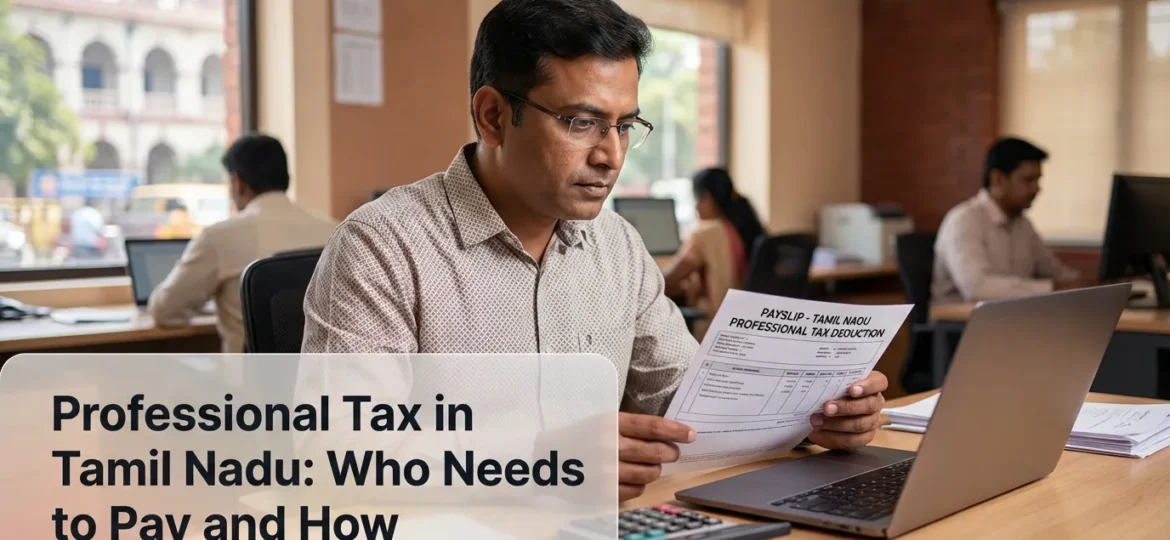
Your Complete Guide to Eligibility, Payment Process, and Rules for Professional Tax in Tamil Nadu
When it comes to taxation in India, most people immediately think of income tax, GST, or corporate tax. But there’s another lesser-talked-about tax that affects almost every working individual in Tamil Nadu — Professional Tax. Despite its name, professional tax is not just for doctors, engineers, or lawyers. It applies to anyone who earns income through a job, business, or self-employment within the state. While the amount is relatively small compared to income tax, failing to pay it on time can result in penalties. In this detailed guide, we’ll explore what professional tax is, who needs to pay, how it is calculated, the payment process, and the penalties for non-compliance.
What is Professional Tax?
Professional Tax is a state-level tax imposed by the Tamil Nadu government on individuals who earn income through employment or by practising a profession, trade, or business. It is collected by municipal corporations, municipalities, or local bodies and is governed under the Tamil Nadu Municipal Laws (Second Amendment) Act, 1998. The money collected through professional tax is used to fund local civic services such as road maintenance, street lighting, public health initiatives, and other developmental projects.
Who Needs to Pay Professional Tax in Tamil Nadu?
PROFESSIONAL TAX APPLIES TO A WIDE RANGE OF INCOME EARNERS IN THE STATE:
Salaried Employees:
If you work for a company or an organisation, you are automatically covered under professional tax laws. Your employer is responsible for deducting the tax every month from your salary and depositing it with the local municipal corporation.
Self-Employed Professionals:
Lawyers, doctors, architects, chartered accountants, engineers, consultants, and other independent professionals must register with the municipal corporation and pay the tax directly.
Business Owners & Traders:
- Anyone operating a shop, trading business, service outlet, or any commercial establishment within Tamil Nadu must pay.
- Freelancers & Gig Workers Even if you don’t have a physical office but earn income through professional work or trade in Tamil Nadu, you may be liable to pay professional tax.
PROFESSIONAL TAX APPLIES TO A WIDE RANGE OF INCOME EARNERS IN THE STATE:
Salaried Employees:
- If you work for a company or an organisation, you are automatically covered under professional tax laws.
- Your employer is responsible for deducting the tax every month from your salary and depositing it with the local municipal corporation.
Self-Employed Professionals:
Lawyers, doctors, architects, chartered accountants, engineers, consultants, and other independent professionals must register with the municipal corporation and pay the tax directly.
Business Owners & Traders:
- Anyone operating a shop, trading business, service outlet, or any commercial establishment within Tamil Nadu must pay.
- Freelancers & Gig Workers Even if you don’t have a physical office but earn income through professional work or trade in Tamil Nadu, you may be liable to pay professional tax.
Professional Tax Slabs in Tamil Nadu (FY 2024–25)
Monthly Salary/Wages (₹) | Monthly Professional Tax (₹) |
Up to ₹21,000 | Nil |
₹21,001 – ₹30,000 | ₹100 |
₹30,001 – ₹45,000 | ₹235 |
₹45,001 – ₹60,000 | ₹510 |
₹60,001 – ₹75,000 | ₹760 |
Above ₹75,000 | ₹1,095 |
Tip: This tax is usually collected monthly for salaried employees but can be paid half-yearly or annuallyby self-employed individuals
How to Pay Professional Tax in Tamil Nadu
THE PAYMENT PROCESS DIFFERS BASED ON YOUR WORK TYPE:
FOR SALARIED EMPLOYEES:
You do not have to make any direct payment. Your employer deducts the tax from your monthly salary and remits it to the municipal corporation. You can see the deduction in your payslip.
FOR SELF-EMPLOYED PROFESSIONALS & BUSINESSES Registration :
Apply for professional tax registration with your local municipal corporation or panchayat. Assessment – Your income is assessed to determine the slab rate applicable to you. Payment – Online: Many corporations, including the Greater Chennai Corporation, allow online payment through their official portals. Offline: Pay directly at the corporation office via challan. Renewal & Compliance – Payments are typically made half-yearly — April–September and October–March.
Due Dates for Professional Tax in Tamil Nadu
For most municipal bodies in Tamil Nadu:
First Half-Year:
Payment due by 30th September.
Second Half-Year:
Payment due by 31st March.
Salaried employees don’t have to worry about due dates as the employer handles it. But self-employed individuals should mark their calendars to avoid penalties.
Penalties for Non-Payment
Failing to pay professional tax on time can lead to: Late Fee Penalty – A percentage of the outstanding amount per month of delay. Legal Action – Continuous non-payment can result in legal notices from the municipal authority. For businesses, repeated non-payment can also impact trade license renewals.
Why Compliance is Important
Paying professional tax is not just about avoiding penalties — it’s a proof of compliance that can be useful for: Government tenders. Trade license renewals. Business loan applications. Professional registrations and certifications. For employees, a payslip showing the deduction is enough proof. For self-employed individuals, the payment receipt serves as valid proof.
Final Word
Professional tax in Tamil Nadu is a small but important part of your financial responsibilities. It’s straightforward to comply with — especially for salaried individuals — but self-employed professionals need to be proactive about registration, payment, and renewals.
If you’re unsure about your liability or want help with registration and timely payment, consult a qualified tax auditor or accountant. They can ensure you stay compliant without last-minute stress and avoid any penalties.
All salaried employees, self-employed professionals (such as doctors, lawyers, architects), freelancers, traders, and business owners operating in Tamil Nadu are liable to pay professional tax.

